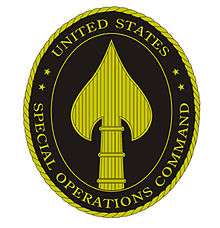Military Liaison Element
A military liaison element (MLE) is small group of special forces personnel, sometimes just one or two at a time, attached to embassies in Africa, Southeast Asia, South America, or elsewhere that terrorists are thought to be operating, planning attacks, raising money or seeking safe haven, especially those teams in the United States.[1] MLEs report to the local US combat commanders and Special Operations Command (SOCOM) and not to the local ambassador or CIA station chief.[2]

These units work to gather information on possible terror threats, but do not actively hunt down terrorists. In addition, MLEs are not undercover.[3] SOCOM, under then Secretary of Defense Donald Rumsfeld, first deployed MLEs in 2003 under the name "Operational Control Elements" a term changed in 2005 because it was considered inappropriate and unpolitic by regional commanders and ambassadors.[4][5]
MLEs were first introduced to the general public by a New York Times expose.[6]
References
- Shanker, Thom (8 March 2006). "Special Operations Troops and Intelligence: Elite Troops Get Expanded Role On Intelligence – New York Times". The New York Times. Africa;Far East, South and Southeast Asia and Pacific Areas;South America. Retrieved 19 May 2011.
- "ICG Spaces – community weblog – Placing SoCom Military Liaison Element assets in the position of both hunter and hunted". Spaces.icgpartners.com. 3 October 2006. Retrieved 19 May 2011.
- "Article: House Republicans Ignore Bush Veto Threat; The Storm And The Ports". AccessMyLibrary. 8 March 2006. Retrieved 19 May 2011.
- Tyson, Ann Scott (22 April 2006). "New Plans Foresee Fighting Terrorism Beyond War Zones". The Washington Post. Retrieved 19 May 2011.
- "SOCOM gets expanded role in intelligence gathering-NYTimes". Militaryphotos.net. Retrieved 19 May 2011.
- THOM SHANKER and SCOTT SHANE, Elite Troops Get Expanded Role on Intelligence, 8 March 2006